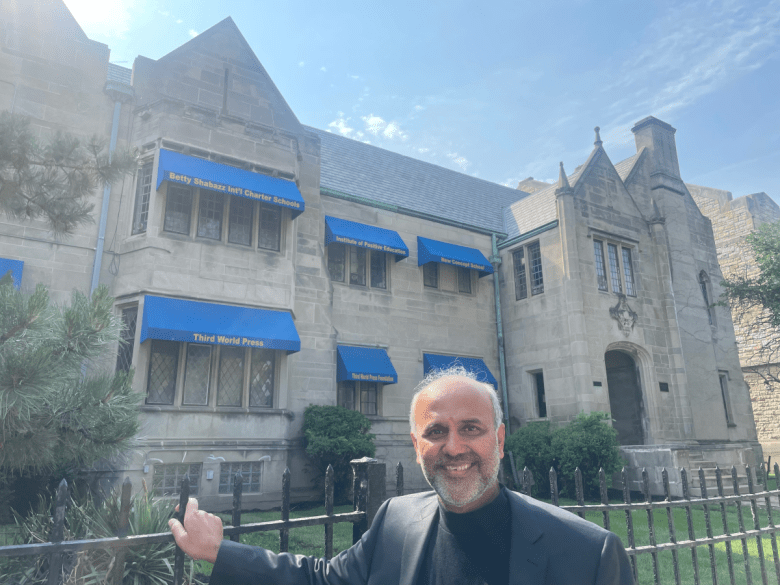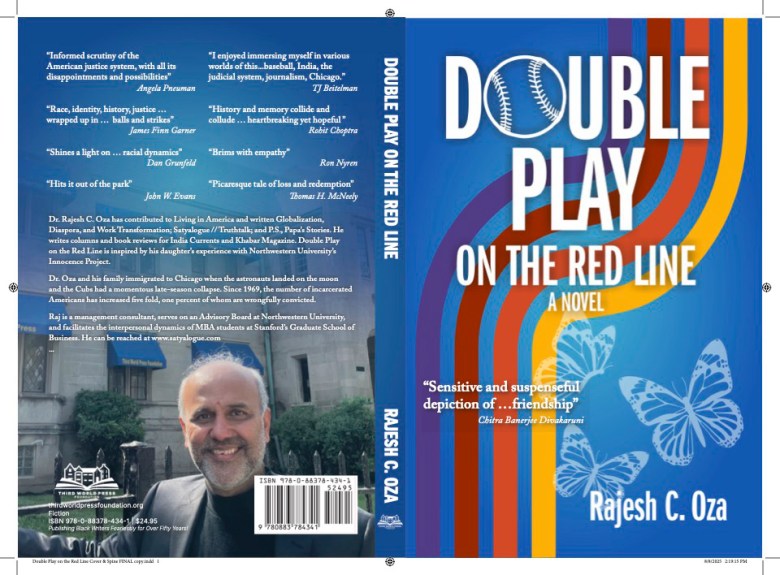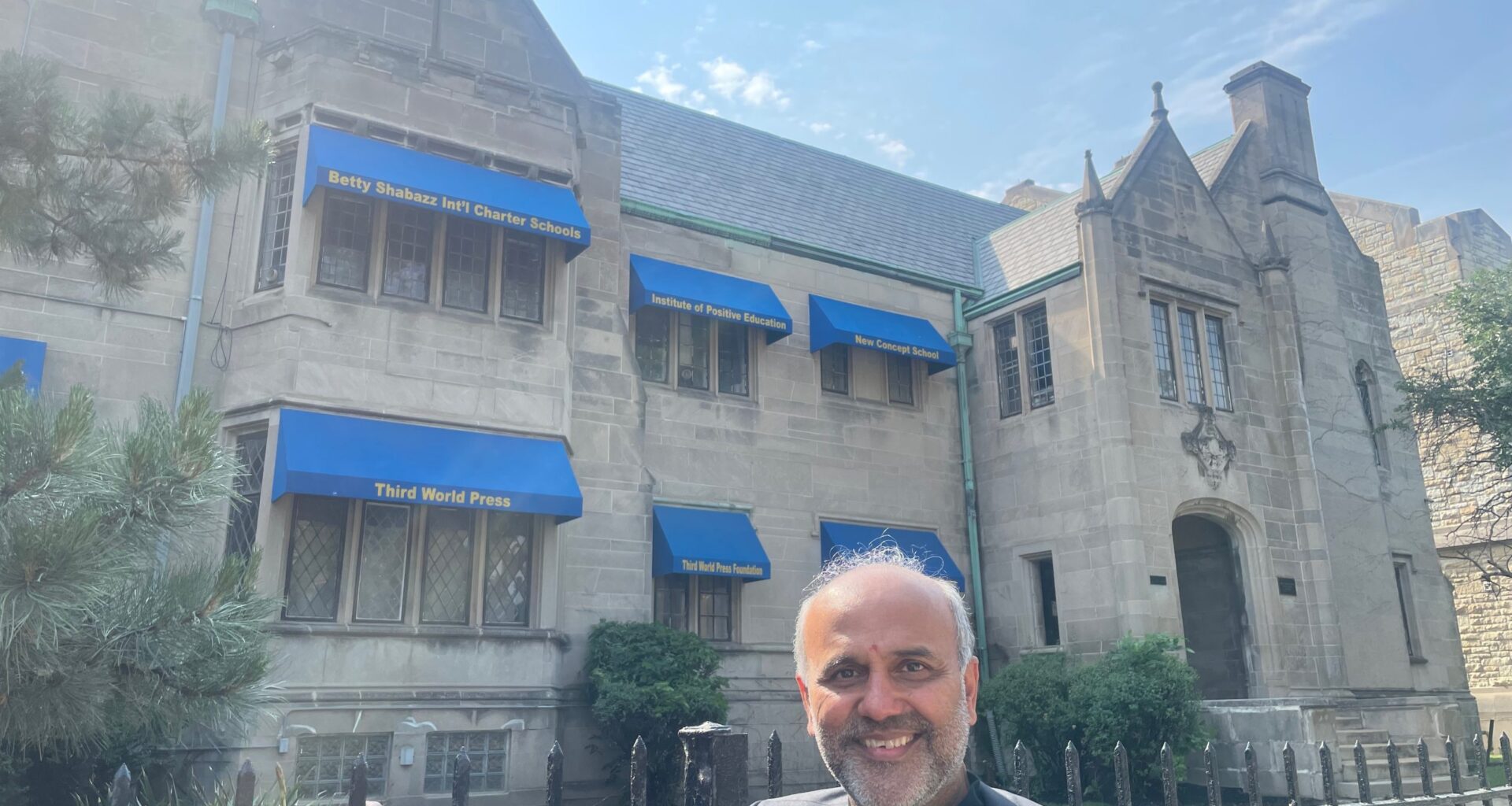 Author Rajesh C. Oza. Courtesy Rajesh C. Oza.
Author Rajesh C. Oza. Courtesy Rajesh C. Oza.
Novelist Toni Morrison famously said “If there’s a book that you want to read, but it hasn’t been written yet, then you must write it.”
For longtime Palo Alto resident Rajesh C. Oza, the process of writing his debut novel “Double Play on the Red Line” was, by his own admission, a way of making good on Morrison’s advice.
Blending genres like historical and autobiographical fiction, the book delves into themes such as racial inequity, immigration law and the American social justice system in the foreground, with Major League Baseball in the background.
Set in 1950s Chicago, the book tells the story of an unlikely friendship between two men of color — Ratan, an Indian-American professor of sports journalism, and Ernie, an African American peanut vendor who loses his shot at a successful baseball career after he is wrongfully convicted of murder. The novel unfolds as Ratan investigates the truth behind the fateful incident that changed Ernie’s life. As Ratan searches for information that will exonerate Ernie, he gets to know him and shares details from his own life. The two men slowly become friends.
That one of Oza’s protagonists is the fictional namesake of baseball legend Ernie Banks is not a coincidence. For years, he said that he has harbored a fascination for the “what ifs” of life and has been very taken by the idea that a single moment can tilt one’s fortunes toward tragedy. Taking a real-life hero and creating an alter ego for him on the page was his way of scratching that mental itch. In real life, Banks, who played for the Chicago Cubs, was a hall of famer, a two-time National League MVP, 14-time All-Star and winner of a Gold Glove award.
The character of Ernie shares some of Banks’ background, including launching a career in the 1950s with the Kansas City Monarchs, a team in the Negro American League, and serving in the U.S. military during the Korean War. Once the fictional Ernie is scouted for the Cubs, his story diverges from that of the real Banks.
“This sense of our doppelgänger, this ‘other,’ this alternate sense of who we are … the reason to use Ernie is to really bring home the fact that this could happen to anyone,” Oza said.
Inspiration for the book first came to Oza back in 2007 when his daughter worked on The Innocence Project, a program at Northwestern University’s Medill School of Journalism, aimed at investigating wrongful convictions. The program was later renamed Medill Justice Project.
 Rajesh C. Oza’s debut novel, “Double Play on the Red Line,” is set in 1950s and ’60s Chicago and features a character with some details inspired by baseball legend Ernie Banks. Courtesy Rajesh C. Oza.
Rajesh C. Oza’s debut novel, “Double Play on the Red Line,” is set in 1950s and ’60s Chicago and features a character with some details inspired by baseball legend Ernie Banks. Courtesy Rajesh C. Oza.
Oza’s daughter and the team she worked with helped prove the innocence of an incarcerated person, but that person was not exonerated. Deeply moved by the story, Oza tried turning it into a work of nonfiction but said that he failed because he felt “too close” to it.
Then during the COVID-19 pandemic, nearly two decades after he first heard the story, he hatched the idea to novelize it. He wrote an “ugly first draft,” followed by a two-year novel writing course at Stanford University, after which he was finally able to create a version of the story that he was happy with. “It stayed with me, it just wouldn’t let go, every part of this story had to be told, it truly has been a slow burn,” he said. “It’s been a long, joyous process.”
Oza, formerly a management consultant, has lived in Palo Alto for close to 30 years with his wife, Mangla Oza, who recently retired as a teacher at the Palo Alto Unified School District. Oza has written several nonfiction works, “Satyalogue // Truthtalk: A Gandhian Guide to (Post) Modern Day Dilemmas” and “Globalization, Diaspora and Work Transformation,” in addition to a collection of autobiographically inspired short stories, “P.S., Papa’s Stories.”
Before moving to Palo Alto in 1997, he lived in Evanston, a suburb of Chicago, closer to where the novel is based.
Though “Double Play on the Red Line” is set in the past, the themes it deals with persist to the present day.
Oza, who worked on Barack Obama’s presidential campaign, recalls having to reckon with race-related psychological barriers while organizing “Camp Obamas” around the area.
“I was asked to open up an office in East Palo Alto; I tried so hard to get people from Palo Alto to come to the East Palo Alto office, but they just wouldn’t come,” he said, marveling at the irony of having to deal with racial stigma while campaigning for a Black presidential candidate. “And that’s why this is not a story set in a particular time, that’s why this is a sad story because it’s timeless.”
Published by Third World Press,”Double Play on the Red Line” is due to be released in September.
Most Popular

